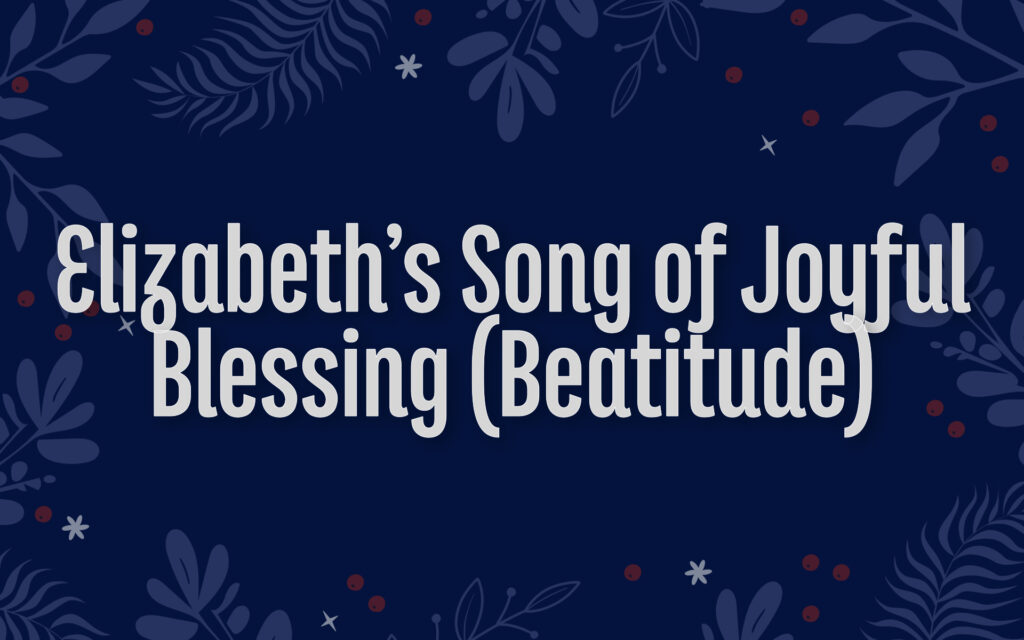The First Songs of Christmas: Elizabeth’s Song of Joyful Blessing

As we enter the Advent season, our hearts turn to the miraculous story of Christ’s birth. While we’re familiar with traditional carols and modern holiday tunes, there’s a set of songs often overlooked – the very first songs of Christmas, recorded in Luke’s gospel. These songs, sung by those who witnessed the unfolding of God’s redemptive plan, offer profound insights into the true meaning of Christmas.
Today, we focus on Elizabeth’s Song of Joyful Blessing, found in Luke 1:39-45. This brief yet powerful song encapsulates the wonder, joy, and faith that characterized the first Christmas.
The Intertwining of Two Miraculous Stories
To fully appreciate Elizabeth’s song, we must understand the context. Luke’s narrative beautifully intertwines the stories of two miraculous pregnancies – that of Elizabeth and Mary. Both women were expecting children through divine intervention: Elizabeth, thought to be barren, was carrying John the Baptist in her old age, while Mary, a young virgin, was carrying Jesus, the Son of God.
The meeting of these two women is a pivotal moment. Mary, having just received the astounding news of her own pregnancy, hurries to visit her older cousin Elizabeth. This journey, a 70-mile trek for a young unmarried woman, was highly unusual for the time, highlighting the extraordinary nature of the events unfolding.
The Supremacy of Jesus
As Mary arrives and greets Elizabeth, something remarkable happens. The baby in Elizabeth’s womb – John the Baptist – leaps for joy, and Elizabeth is filled with the Holy Spirit. Her immediate response is a song of blessing, recognizing the supreme importance of the child Mary carries.
Elizabeth’s words are profound: “Blessed are you among women, and blessed is the child you will bear! But why am I so favored, that the mother of my Lord should come to me?” (Luke 1:42-43)
This declaration is revolutionary. Elizabeth, the older, married woman of higher social standing, humbles herself before Mary, a young, unmarried girl. Why? Because she recognizes that Mary carries the Lord Himself. Elizabeth’s song teaches us a crucial lesson: when we truly understand who Jesus is, our perspective on everything else shifts. Our focus moves from ourselves to the supreme glory of Christ.
The Joy of Blessing
Elizabeth’s song is saturated with the concept of blessing. She uses the word “blessed” three times in this short passage. This blessing isn’t just a polite greeting; it’s a profound recognition of God’s favor and the deep, abiding joy that comes from being part of God’s redemptive plan.
The Greek word used for “blessed” in verse 45 is ‘makarios,’ which conveys the idea of deep, settled happiness. It’s the same word used in the Beatitudes (Matthew 5:3-12). This blessing isn’t dependent on circumstances but on the assurance of God’s presence and promises.
As we reflect on Elizabeth’s words, we’re reminded that true joy comes not from our circumstances or achievements, but from recognizing our place in God’s grand narrative. Like Elizabeth, we can find profound joy in playing even a small part in God’s redemptive work.
The Blessing of Believing God’s Word
Perhaps the most striking aspect of Elizabeth’s song is her commendation of Mary’s faith. She declares, “Blessed is she who has believed that the Lord would fulfill his promises to her!” (Luke 1:45)
This statement becomes even more poignant when we contrast Mary’s response to the angel’s message with that of Zechariah, Elizabeth’s husband. When told of Elizabeth’s impending pregnancy, Zechariah doubted, asking for a sign. In contrast, Mary, faced with an even more incredible promise, responds with simple faith: “May your word to me be fulfilled” (Luke 1:38).
Elizabeth’s song challenges us to examine our own faith. Do we, like Mary, trust God’s promises even when they seem impossible? Or do we, like Zechariah, let our doubts overshadow God’s word?
Applying Elizabeth’s Song to Our Lives
As we meditate on Elizabeth’s song, several applications emerge:
1. Delight in the supremacy of Jesus: Like Elizabeth, we’re called to recognize and rejoice in Christ’s lordship over all aspects of our lives. This Advent season provides an opportunity to renew our focus on Jesus’ supremacy.
2. Embrace the joy of blessing: Remember that as believers, we are deeply blessed by God. This blessing isn’t based on our circumstances but on our identity as God’s children.
3. Believe God’s Word: Let Mary’s example inspire us to trust God’s promises, even when they seem impossible. Challenge yourself to “doubt your doubts” and believe God’s word.
4. Cultivate gratitude: Elizabeth’s humble joy at being included in God’s plan reminds us to be grateful for any role we play in God’s kingdom work.
5. Seek the Holy Spirit’s guidance: Elizabeth’s Spirit-filled response reminds us of the importance of being attuned to the Holy Spirit’s leading in our lives.
As we journey through this Advent season, let Elizabeth’s song of joyful blessing resonate in our hearts. May we, like her, recognize the supreme glory of Christ, rejoice in God’s blessings, and respond with unwavering faith to His promises.
In a world that often misses the true meaning of Christmas, let’s commit to focusing on the marvel of the incarnation – that God Himself took on flesh and came to dwell among us. As we do, may we find ourselves, like Elizabeth, filled with joy and ready to burst forth in songs of praise to our Lord and Savior.
This Christmas, amidst the carols and festivities, let’s not forget to sing our own songs of joyful blessing, recognizing the incredible gift we’ve been given in Christ. For truly, as Elizabeth proclaimed, blessed are those who believe that the Lord will fulfill His promises!
